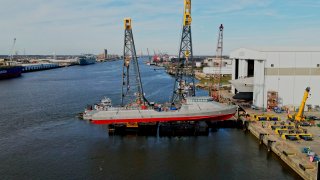Meet The U.S. Navy's Vanguard: The First Purpose-Built USV
Notable about Vanguard is that it is the first USV built for the U.S. Navy for autonomous operations from the keel-up. It was jointly developed by a team led by Austal USA and L3Harris.
In military terms, the “vanguard” is the foremost contingent of an advancing army or naval force, but it also means the effort to lead the way in new developments or ideas. Thus, it is a fitting name for the U.S. Navy’s first purpose-built Unmanned Surface Vessel (USV), which was recently christened at a ceremony in Mobile, Alabama.
Vanguard is part of the Department of Defense’s (DoD’s) “Ghost Fleet Overlord USV” program, which the Defense Department’s Strategic Capabilities Office (SCO) officially transitioned to the Navy Program Executive Office, Unmanned and Small Combatants (PEO USC) in March 2022. SCO initiated the Ghost Fleet Overlord Program in 2018 to accelerate the U.S. Navy’s adoption of unmanned and autonomous systems.
“Vanguard’s name could not be more fitting,” suggested Capt. Scot Searles, Unmanned Maritime Systems program manager.
“The state-of-the-art technology she will employ is revolutionary and will be at the forefront of establishing new standards for our fleet,” Searles added. “We are thrilled to achieve this important milestone and are looking forward to Vanguard leading the way as she enhances our nation’s naval power and strategic capabilities.”
Truly, At the Vanguard
Notable about Vanguard is that it is the first USV built for the U.S. Navy for autonomous operations from the keel-up. It was jointly developed by a team led by Austal USA and L3Harris. The USV was launched in January, and once outfitting and testing of Vanguard is complete, she will join her sister ships, OUSV2 Ranger and OUSV4 Mariner, in San Diego as part of the U.S. Navy’s USV Division 1—the Surface navy organization responsible for the experimentation and tactical development of the autonomous vessels.
“Vanguard represents a significant leap forward in unmanned technology,” said Rear Adm. Kevin Smith, program executive officer for the Unmanned and Small Combatants program, in a statement. “The addition of Vanguard will enable the expansion of unmanned testing, experimentation and development, accelerating the transition to the hybrid fleet.”
Operation Overlord
The Overlord program has been seen as critical in accelerating and advancing the use of unmanned technology across the sea service. It launched the U.S. Navy’s experimentation with USVs, and the resulting prototypes are on track to prepare for fleet-wide adoption of USVs in operations.
The timing of the program is notable, as the U.S. Navy continues to struggle to build and maintain its large surface fleet—while it is also facing a serious shortage of sailors. Smaller, faster-to-build uncrewed vessels could be the solution to both issues, as the knowledge and experience gained from the Overlord could help drive the development and requirements for the Large USV (LUSV) program. Intended to be low-cost and modular in design to allow for a variety of mission payloads, the LUSV could further offer great endurance and be deployed longer than manned vessels. Operated remotely and semi-autonomously, such vessels wouldn’t need the large crews of the current surface fleet.
Vanguard Vs. Disruption
As reported by Maritime Executive, Overlord could also fit the mold for future DoD plans, as laid out by its Replicator program, which calls for cost-effective, unmanned platforms that can be produced en masse. Yet, there could be challenges for Overlord and similar efforts to make much headway. Currently, the manned procurement budget outweighs the unmanned by a factor of 600:1.
The main issue is that the U.S. Navy has a long tradition of maintaining old systems and fighting any change. It was still focused on building battleships when the aircraft carrier was clearly the future, and it now continues to spend billions on its supercarriers instead of looking at smaller options.
Vanguard could lead the way towards convincing the Navy to embrace those new ideas.
Author Experience and Expertise: Peter Suciu
Peter Suciu is a Michigan-based writer. He has contributed to more than four dozen magazines, newspapers, and websites with over 3,200 published pieces over a twenty-year career in journalism. He regularly writes about military hardware, firearms history, cybersecurity, politics, and international affairs. Peter is also a Contributing Writer for Forbes and Clearance Jobs. You can follow him on Twitter: @PeterSuciu. You can email the author: [email protected].


